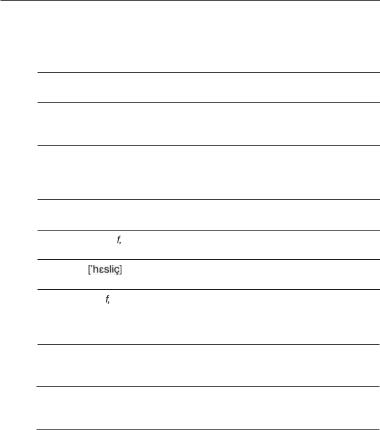
Basic_German_Vocabulary
.pdf
IX
In add ition to th e thematic present ation , all entries are present ed co ntextually, i.e., samp ie sentence s accompany each basic word and its p ronun- ciation. The presentation of the basic wo rd in sente nces is important because the learner sees the word used co rrectly.The danger of using th e word later in the wra ng contex t will disapp ear. Exampl e sentences ofte n can be used word-fo r-wo rd because th ey are taken frorn co mmo n every- day speech an represent frequ entl y used idiom atic express ions.
In the Workb ook to th e Basic Vocabul ary th ere are furth er examples ot usage. In eac h of the sampie sentences, care has been taken so that th e voca bulary used, as far as possibl e, does not include any wo rds beyond those found in th e basic voca bulary.
"Langenscheidt's BasicGerman Vocabulary" and "Workbook"
The Workbook acc ompa nies th e Basic Vocabul ary. It is left up to the learner w hether to study only with the Basic Vocabul ary or to do furth er exercices tor vocabul ary building. For a quick and certain expansion of th e voca bulary, we recommend th e use of th e wo rkbook as weil as th e text. Systematic wo rk with th e tw o volumes creates a certain co nfidence in vocabulary building whic h helps the acquisition of new wo rds .
Alth ough gend er inform ation and irregular verb form s are given next to the basic wo rd, th e text and Workbook are not meant to repl ace, but rath er supplement , th e use of a dicti onary and grammar book .
In so me cases a wo rd has various meanings whic h are clarified in th e sampie sente nces .
For example:
Fußball ['fu:sbal] m, -(e)s, kein PI. |
football, soccer n |
Fußb all ist bei uns die beliebt este |
Football is the most pop ular spo rt |
Sport art. |
in our co untry. (footb all as agame) |
but |
|
|
|
Fußball m, -(e)s, Fußb älle |
football , soccer ball n |
Die Fußb älle sind aus Leder. |
Footb alls are made of leath er. |
|
(footb all as an object) |
Natur ally a voc abulary list cannot present all th e meaning s and uses of a word in all circumsta nces . For example, ther e are seldo m-used form s of verb s th at learners will not find here because th ey are not necessary for acquiring a basic knowledge of th e language. There are also very few techni cal words included ; only th e co mmo n meaning s of words are given.

x
Frequ ency of use and usefulness ot the word determined inclusion into the Basic Vocabulary.
Likewise, the Basic Vocabulary includ es only a handful of the many compound words so common in German. But a solid knowledg e of basic vocab ulary should enable a learner to understand and build a wider voca bulary of compound words.
How to Work wit h the "Basic Vocabulary"?
Here are nine suggestio ns for working with the material:
1. Learn the words |
in the "1-2,000" group first. 0 0 those in the |
"2 ,001-4,000" group |
later. |
2. Take adva nta ge of the arrangement by subject area. Don'twork on a page-b y-page basis, but try to co ve r one topic at a tim e (e.g., "Money"). The words of a subject area cont ain assoc iations which aid memorization. Use the designations of subject areas as learning aids.
3. Work through the individual categories one by one, first covering those whose topi cs most appeal to you. Always review each category already co ve red afte r worki ng on a new category.
4. Set up your own learning system . Learn the amount of material that best suits you. Read an item (the main word in bold print with its example sentences) and memorize the category the word belongs in. Go through eight to ten word s this way. Then cover the left co lumn and repeat aloud the covered word s. If you wish, also read aloud the sampie sentence. Check your progress by uncovering the left co lumn. Work through your "set" thi s way. Make a mark in th e left margin next to the words you haven 't memorized yet and work on just those words. For the final check of each "set ", speak and write every word again.
5. Vary your study habits: Cover the right co lumn instead of the left , and work as describ ed in suggestion 4 above . Only learn the example senten- ces that help fix the meaning of the words in your memory.
6. You can also take an individual word that you have had to look up in an alphabetical list , put it in a category, and learn it in a meaningful context.
7. Every day learn a spec ific amount, taking breaks in betwee n each session. In a few weeks you will have systemat ically learned a core vocab ulary; the actual amount of vocabulary items depend s on you. Don't forget to repeat and test yourself at regular intervals.
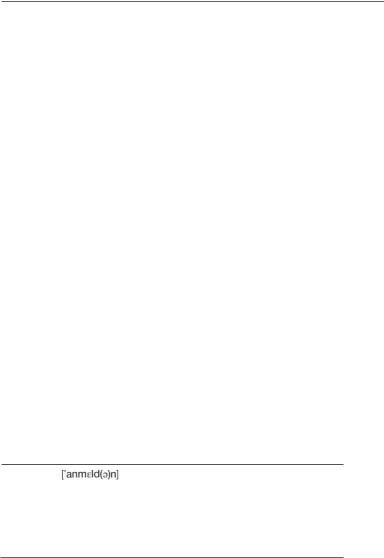
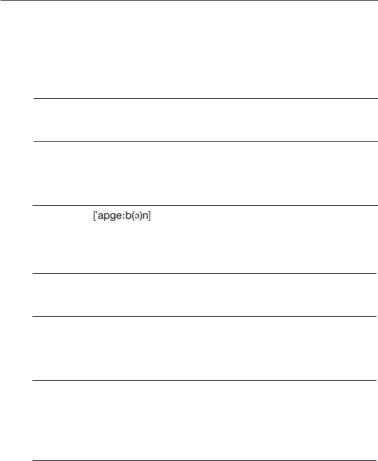
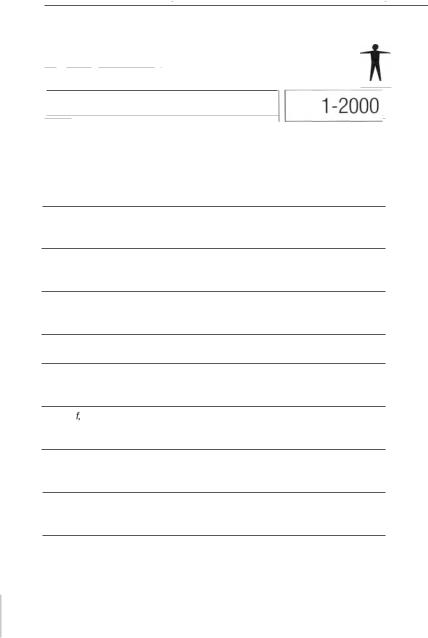
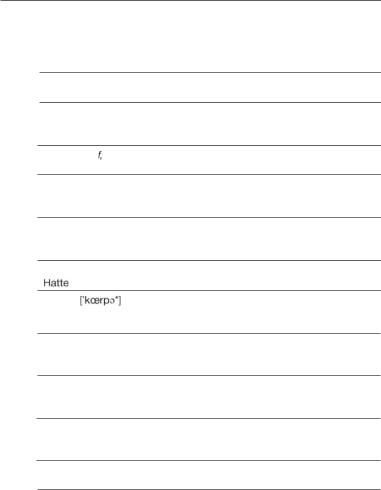
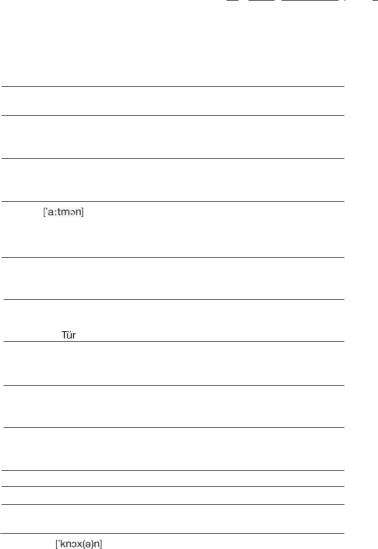

4
Leib [Iaip] m, -(eis, -er |
body n |
Sie hat am ganzen Leib rote |
She has red spots all over her |
Flecken. |
body. |
(Augen-)Lid [Ii:t] n, -(eis, -er |
(eye)lid n |
Das recht e Augenlid tut weh. |
The right eyelid is sore . |
Lippe ['lipa] t, -, -n |
lip n |
Komm aus dem Wasser! Du hast |
Get out of the water! Your lips are |
schon ganz blaue Lipp en. |
all blue. |
Lunge [Iu rja] t, -,-n |
lung n |
Hör auf mit dem Rauchen! Deine |
Stop smoki ng! Your lungs must |
Lunge ist best immt schon ganz |
be all black by now. |
schwarz . |
|
Magen ['ma:g(a)n] m, -s, Mäge n |
stornach n |
Ich kann nicht viel essen. Mein |
I can'teat much. l'rnhaving pro- |
Mage n ist nicht in Ordnung. |
blems with my sto mac h. |
Muskel ['musk(a)l] m, - S , -n |
museIe n |
Er hat starke Muskeln. |
He has strong muscles. |
Nerv [ncrf] m, -B, -en |
nerve n |
Gott sei Dank hat der Zahnarzt |
Thank God the dentist didn 'thit a |
beim Boh ren keinen Nerv ge- |
nerve while he was drilling! |
troff en. |
|
Schulter ['Julta*] t. -,-n |
shoulder n |
Das Kind saß a uf ihren Schultern. |
The child sat on her shoulders. |
Schweiß [j vais] m, -es, kein PI. |
sweat n |
Der Sc hweiß li ef ihr von der Stirn . |
Her face was drippi ng with sweat. |
Stirn [Jtirn] t. -, -en |
forehead n |
Das Kind hat kein Fieber. Die Stirn |
The child doesn't have a fever. |
ist ganz kalt. |
His forehead is cool. |
Zeh [tse:] m, - S, -en |
toe n |
Zehe [t s e :e] t, -, -n |
toe n |
Ich bin mit de n Zehen gege n ein |
I stubbed my toes on a table leg. |
Tischb ein gesto ßen. |
|
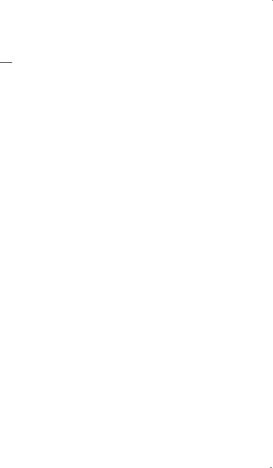
_ _ _ _ _ _ ___11 Der Mensch I |
5 |
||||||||||||||||
|
|
|
|
|
|
|
|
|
|
|
|
|
|
||||
|
|
|
|
1 The Human Being |
|
|
|
||||||||||
|
|
|
|
|
|
|
|
|
|
|
|
|
|
|
|
|
|
_ |
__11_ |
|
|
- |
|
|
|
|
|
|
|||||||
11.2 Aussehen |
|
|
|
|
|
|
|
|
1-2000 |
1 |
|
|
|
||||
|
|
|
|
|
|
|
|
|
|
|
|
|
|
||||
|
1.2 Appearance |
|
|
|
|
|
|
|
|
|
|
|
|
|
|
|
|
|
|
|
|
|
|
|
|
|
|
|
|
|
|
|
|
|
|
aussehen ['ausze:(a)n] V/i., + |
appear, look (Iike) v |
|
|
|
|
|
|
|
|
||||||||
|
Präp. (wie), sah aus, hat ausge- |
|
|
|
|
|
|
|
|
|
|
|
|
|
|
|
|
|
sehen |
|
|
|
|
|
|
|
|
|
|
|
|
|
|
|
|
|
Sie ist erst 17, aber sie sieht aus |
She is only 17, but she looks (Iike) |
|
|
|
||||||||||||
|
wie 20. |
|
20. |
|
|
|
|
|
|
|
|
|
|
|
|
|
|
dick [dik] Adj. |
|
fat, thick |
|
|
|
|
|
|
|
|
|||||||
|
Findest du mich zu dick? |
|
0 0 you think I'mtoo fat? |
|
|
|
|
|
|
|
|||||||
dünn [dyn] Adj. |
|
th in |
|
|
|
|
|
|
|
|
|||||||
|
Warum bist du denn so dünn? |
Why are you so thin anyway? |
|
|
|
||||||||||||
groß [gro:s] Adj., größer, |
am |
big , large, great, tall |
|
|
|
|
|
|
|
|
|||||||
|
größ ten |
|
|
|
|
|
|
|
|
|
|
|
|
|
|
|
|
|
Ich bin größer als me in Mann. |
I am taller than my husband. |
|
|
|
||||||||||||
hübsch [hypn Adj., -er, am -esten |
pretty |
|
|
|
|
|
|
|
|
||||||||
|
Das Kleid sieht hübsch aus. |
The dress looks pretty. |
|
|
|
|
|
|
|
||||||||
klein [klain] Adj. |
|
smalI, little |
|
|
|
|
|
|
|
|
|||||||
|
Ich habe sehr kleine Füße . |
|
I have very small feet. |
|
|
|
|
|
|
|
|||||||
schlank [Jlal)k] Adj. |
|
slender |
|
|
|
|
|
|
|
|
|||||||
|
Er ist groß und schlan k. |
|
He is tall and slender. |
|
|
|
|
|
|
|
|||||||
schön [Jo:n] Adj. |
|
beautiful |
|
|
|
|
|
|
|
|
|||||||
Sie hat schöne Augen. |
|
She has beaut iful eyes. |
|
|
|
|
|
|
|
||||||||
|
|
12001 -4000 I |
||
abnehmen ['apne:man] V/i ., |
|
|
|
|
take off, lose we ight v |
||||
nahm ab, hat abgenommen |
|
|
|
|
Er hat über 10 Pfund abge- |
He lost over 10 pounds. |
|||
nommen . |
|
|
|
|
Bart [ba.a't]m, -(e)s, Bärte |
beard n |
|||
Dein Bart muss geschnitten |
Your beard has to be trimmed. |
|||
werden. |
|
|
|
|
